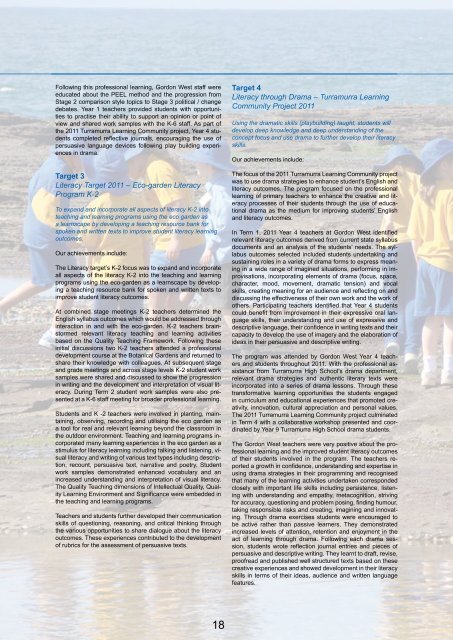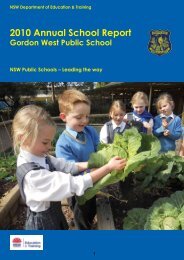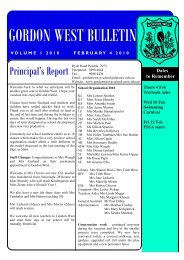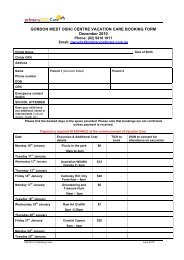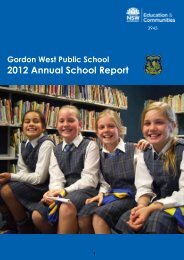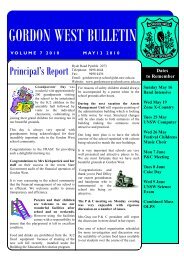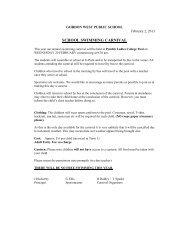2011 Annual School Report - Gordon West Public School
2011 Annual School Report - Gordon West Public School
2011 Annual School Report - Gordon West Public School
You also want an ePaper? Increase the reach of your titles
YUMPU automatically turns print PDFs into web optimized ePapers that Google loves.
Following this professional learning, <strong>Gordon</strong> <strong>West</strong> staff were<br />
educated about the PEEL method and the progression from<br />
Stage 2 comparison style topics to Stage 3 political / change<br />
debates. Year 1 teachers provided students with opportunities<br />
to practise their ability to support an opinion or point of<br />
view and shared work samples with the K-6 staff. As part of<br />
the <strong>2011</strong> Turramurra Learning Community project, Year 4 students<br />
completed reflective journals, encouraging the use of<br />
persuasive language devices following play building experiences<br />
in drama.<br />
Target 3<br />
Literacy Target <strong>2011</strong> – Eco-garden Literacy<br />
Program K-2<br />
To expand and incorporate all aspects of literacy K-2 into<br />
teaching and learning programs using the eco garden as<br />
a learnscape by developing a teaching resource bank for<br />
spoken and written texts to improve student literacy learning<br />
outcomes.<br />
Our achievements include:<br />
The Literacy target’s K-2 focus was to expand and incorporate<br />
all aspects of the literacy K-2 into the teaching and learning<br />
programs using the eco-garden as a learnscape by developing<br />
a teaching resource bank for spoken and written texts to<br />
improve student literacy outcomes.<br />
At combined stage meetings K-2 teachers determined the<br />
English syllabus outcomes which would be addressed through<br />
interaction in and with the eco-garden. K-2 teachers brainstormed<br />
relevant literacy teaching and learning activities<br />
based on the Quality Teaching Framework. Following these<br />
initial discussions two K-2 teachers attended a professional<br />
development course at the Botanical Gardens and returned to<br />
share their knowledge with colleagues. At subsequent stage<br />
and grade meetings and across stage levels K-2 student work<br />
samples were shared and discussed to show the progression<br />
in writing and the development and interpretation of visual literacy.<br />
During Term 2 student work samples were also presented<br />
at a K-6 staff meeting for broader professional learning.<br />
Students and K -2 teachers were involved in planting, maintaining,<br />
observing, recording and utilising the eco garden as<br />
a tool for real and relevant learning beyond the classroom in<br />
the outdoor environment. Teaching and learning programs incorporated<br />
many learning experiences in the eco garden as a<br />
stimulus for literacy learning including talking and listening, visual<br />
literacy and writing of various text types including description,<br />
recount, persuasive text, narrative and poetry. Student<br />
work samples demonstrated enhanced vocabulary and an<br />
increased understanding and interpretation of visual literacy.<br />
The Quality Teaching dimensions of Intellectual Quality, Quality<br />
Learning Environment and Significance were embedded in<br />
the teaching and learning programs.<br />
Teachers and students further developed their communication<br />
skills of questioning, reasoning, and critical thinking through<br />
the various opportunities to share dialogue about the literacy<br />
outcomes. These experiences contributed to the development<br />
of rubrics for the assessment of persuasive texts.<br />
Target 4<br />
Literacy through Drama – Turramurra Learning<br />
Community Project <strong>2011</strong><br />
Using the dramatic skills (playbuilding) taught, students will<br />
develop deep knowledge and deep understanding of the<br />
concept focus and use drama to further develop their literacy<br />
skills.<br />
Our achievements include:<br />
The focus of the <strong>2011</strong> Turramurra Learning Community project<br />
was to use drama strategies to enhance student’s English and<br />
literacy outcomes. The program focused on the professional<br />
learning of primary teachers to enhance the creative and literacy<br />
processes of their students through the use of educational<br />
drama as the medium for improving students’ English<br />
and literacy outcomes.<br />
In Term 1, <strong>2011</strong> Year 4 teachers at <strong>Gordon</strong> <strong>West</strong> identified<br />
relevant literacy outcomes derived from current state syllabus<br />
documents and an analysis of the students’ needs. The syllabus<br />
outcomes selected included students undertaking and<br />
sustaining roles in a variety of drama forms to express meaning<br />
in a wide range of imagined situations, performing in improvisations,<br />
incorporating elements of drama (focus, space,<br />
character, mood, movement, dramatic tension) and vocal<br />
skills, creating meaning for an audience and reflecting on and<br />
discussing the effectiveness of their own work and the work of<br />
others. Participating teachers identified that Year 4 students<br />
could benefit from improvement in their expressive oral language<br />
skills, their understanding and use of expressive and<br />
descriptive language, their confidence in writing texts and their<br />
capacity to develop the use of imagery and the elaboration of<br />
ideas in their persuasive and descriptive writing.<br />
The program was attended by <strong>Gordon</strong> <strong>West</strong> Year 4 teachers<br />
and students throughout <strong>2011</strong>. With the professional assistance<br />
from Turramurra High <strong>School</strong>’s drama department,<br />
relevant drama strategies and authentic literary texts were<br />
incorporated into a series of drama lessons. Through these<br />
transformative learning opportunities the students engaged<br />
in curriculum and educational experiences that promoted creativity,<br />
innovation, cultural appreciation and personal values.<br />
The <strong>2011</strong> Turramurra Learning Community project culminated<br />
in Term 4 with a collaborative workshop presented and coordinated<br />
by Year 9 Turramurra High <strong>School</strong> drama students.<br />
The <strong>Gordon</strong> <strong>West</strong> teachers were very positive about the professional<br />
learning and the improved student literacy outcomes<br />
of their students involved in the program. The teachers reported<br />
a growth in confidence, understanding and expertise in<br />
using drama strategies in their programming and recognised<br />
that many of the learning activities undertaken corresponded<br />
closely with important life skills including persistence, listening<br />
with understanding and empathy, metacognition, striving<br />
for accuracy, questioning and problem posing, finding humour,<br />
taking responsible risks and creating, imagining and innovating.<br />
Through drama exercises students were encouraged to<br />
be active rather than passive learners. They demonstrated<br />
increased levels of attention, retention and enjoyment in the<br />
act of learning through drama. Following each drama session,<br />
students wrote reflection journal entries and pieces of<br />
persuasive and descriptive writing. They learnt to draft, revise,<br />
proofread and published well structured texts based on these<br />
creative experiences and showed development in their literacy<br />
skills in terms of their ideas, audience and written language<br />
features.<br />
18


